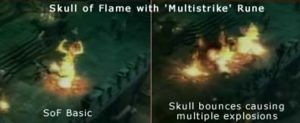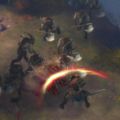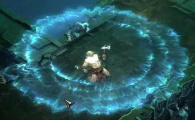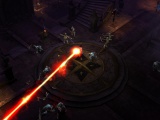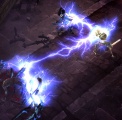Contents
AoE In the Game
Many attacks in Diablo III will have the potential to affect more than one target. Some skills will need to be upgraded with points in a mastery skill (the Wizard's Tornado originally produces one tornado, but adding skill points to Epic Storms increases the amount of tornados allowed at once) or used in conjunction with Skill Runes (the Witch Doctor's Skull of Flame used with a multi-strike rune allows the skull to bounce along the ground and explode multiple times) to affect muliple targets.
The area that is affected can vary greatly, from a few monsters up close from a Barbarian attacking with Cleave, or a dozen monsters being crushed under a destructible wall.
The effect of an AoE varies from a damaging attack to a buff/debuff cast on allies/enemies.
Male Barbarian using Battle Cry. Circular AoE buff
Female Witch Doctor using Soul Harvest. Circular AoE damage and self-buff
Effects
An AoE spell or effect does not need to cause damage. It can give nearby players a buff, give monsters a debuff, or be a combination of the above. Some AoE effects will affect the environment, which in turn effects anyone walking in to that environment.
Friendly Fire
Diablo II and Diablo III does not have friendly fire for allies, and this includes AoE spells. The game would not be even remotely the same if friendly fire was used. Generally, only positive effects will apply to allies of an AoE caster.
Shapes
The actual area of an AoE skill can be of any shape or size. Some examples are: circular AoE emanating from the player (Wizard's Frost Nova), a specific area the player chooses (Wizard's Meteor Storm), Line Damage (Wizard's Disintegrate), or jumping from one target to another (Wizard's Electrocute). Out of the lot, the
A "line AoE" damage does not need to be a straight line either. It can be crescent shaped, or swirly, but the main part is usually that it's significantly longer than wide in the area of effect.
Female Wizard using Frost Nova. Circle expanding, self-consuming damage and debuff spell.
Female Wizard using Meteor Storm. Multiple AoEs spell.
Female Wizard using Disintegrate. Line AoE spell.
Female Wizard using Electrocute. multiple target direct damage spell that's "AoE-like".
Functionality
Besides different shapes, there are also different ways that the AoE effect functions. It's usually a stationary effect, or moving, and when it's moving, it usually consumes itself on obstacles and enemies. The area can also expand or contract, depending on effect.
A few examples:
- A classic Fire Wall in Diablo II or Diablo I will be stationary, and anyone walking in to it will be damaged. The duration is set in the spell cast, as is damage. This is a quite classical shape and functionality to a spell. It's a long shaped cube of fire damage.
- Wizard Frost Nova is an expanding circle (note: not "circular") that will hit anything that is not behind cover from other monsters, or obstacles. It only hits the first few enemies close to the caster. It's another classical shape, and works very different from the Fire Wall.
- Some similar spells are not a true circle AoE, but rather a large array of "bolts" of one form or another. The effect is very similar, but at a little further range, the space between the individual magical projectiles can be so large it misses enemies, wasting that projectile. It's not a real AoE spell, but it has AoE-like functionality.
- Wizard Disintegrate is a line AoE damage that is not consumed when hitting monsters. All monsters in a line will get damaged by the spell.
- Wizard Meteor Storm can be seen as a large AoE damage spell in general, but in reality it's a barrage of smaller AoE damage effects. Each meteor has a small circular AoE damage, and multiple of them will cover a large area.
- Wizard Electrocute is not exactly a real AoE spell either, as it's a multiple target direct damage spell. The spell will hit a designated target, and then a few other randomly selected nearby targets, but not necessarily all targets. It's different than the Witch Doctor spell Skull of Flame combined with multi-strike rune, which work more similar to the Meteor Storm spell, as it has multiple small areas of effect.
